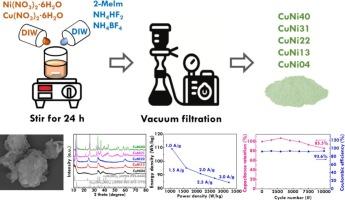Modulated synthesis of nickel copper bimetallic compounds by ammonium fluoride-based complex as novel active materials of battery supercapacitor hybrids
IF 8.9
2区 工程技术
Q1 ENERGY & FUELS
引用次数: 0
Abstract
Bimetallic compounds have attracted much attention as efficient active materials of battery supercapacitor hybrid (BSH), owing to their multiple redox states, high electrical conductivity, and simply synthesis process. Nickel-based compounds offer high theoretical capacities, while copper-based compounds provide high electrical conductivity. The energy storage performance can be further enhanced designing favorable morphologies, which can be influenced by the incorporation of structure directing agents (SDAs) such as NH4BF4 and NH4HF2. In this study, nickel and copper bimetallic compounds are synthesized as active materials of BSHs in a novel environment containing metal salts, NH4BF4, NH4HF2, and 2-methylmidozole. The effects of the Cu to Ni ratio on material and electrochemical properties are investigated. To enhance the electrochemical contributions of nickel, which has higher theoretical capacities, the reaction time for copper ions is reduced. The optimal bimetallic (CuNi13) electrode achieves the highest specific capacitance (CF) of 1758.0 F/g, corresponding to a capacity of 791.1C/g at 1 A/g, due to the higher nickel content and smaller sheet sizes. The BSH assembled using the CuNi13 and reduced graphene oxide electrodes demonstrates a maximum energy density of 109.1 Wh/kg at 1071 kW/kg. The CF retention of 85.5% and Coulombic efficiency of 93.6% are also maintained after 10,000 cycles.

用氟化铵络合物调制合成镍铜双金属化合物,作为新型电池超级电容器混合活性材料
双金属化合物作为混合电池超级电容器(BSH)的高效活性材料,因其多重氧化还原态、高导电性和简单的合成工艺而备受关注。镍基化合物具有很高的理论容量,而铜基化合物则具有很高的导电性。通过设计有利的形态可进一步提高储能性能,而加入结构引导剂(SDA)(如 NH4BF4 和 NH4HF2)则可影响储能性能。本研究在含有金属盐、NH4BF4、NH4HF2 和 2-甲基咪唑的新型环境中合成了镍和铜双金属化合物,作为 BSHs 的活性材料。研究了铜镍合金比例对材料和电化学特性的影响。镍的理论容量较高,为了提高镍的电化学贡献,缩短了铜离子的反应时间。由于镍含量较高和薄片尺寸较小,最佳双金属(CuNi13)电极的比电容(CF)最高,达到 1758.0 F/g,相当于 1 A/g 时的电容量 791.1C/g。使用 CuNi13 和还原氧化石墨烯电极组装的 BSH 在 1071 kW/kg 时的最大能量密度为 109.1 Wh/kg。经过 10,000 次循环后,CF 保持率为 85.5%,库仑效率为 93.6%。
本文章由计算机程序翻译,如有差异,请以英文原文为准。
求助全文
约1分钟内获得全文
求助全文
来源期刊

Journal of energy storage
Energy-Renewable Energy, Sustainability and the Environment
CiteScore
11.80
自引率
24.50%
发文量
2262
审稿时长
69 days
期刊介绍:
Journal of energy storage focusses on all aspects of energy storage, in particular systems integration, electric grid integration, modelling and analysis, novel energy storage technologies, sizing and management strategies, business models for operation of storage systems and energy storage developments worldwide.
 求助内容:
求助内容: 应助结果提醒方式:
应助结果提醒方式:


